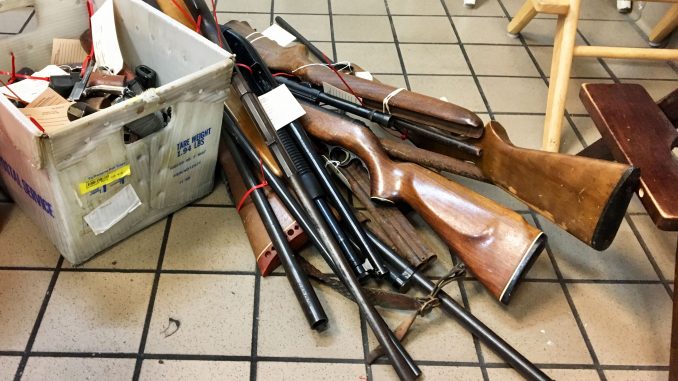
North Philadelphia community advocacy groups and the Philadelphia Police Department are reinvigorating their anti-gun violence efforts, while the city is in the midst of one of the deadliest years for gun violence and national pressure builds to regulate the use of firearms.
A majority of Main Campus sits in the 22nd Police District, which has some of the highest rates of gun violence in the city. To combat the presence of weapons in the community, PPD regularly holds gun buyback events that give residents the opportunity to safely and anonymously turn in unwanted firearms in exchange for payment.
On March 2, PPD held its first buyback of 2018 at its station on 17th Street near Montgomery Avenue.
“People can come in anonymously and turn in their guns,” said Officer Joseph Walsh, who assisted at the event. “Hopefully it makes the city safer.”
Residents who turned in their guns received a $75 gift card to the clothing store Official Unlimited on Broad and York streets. The store’s owner, Yoni Nadav, sponsored the event.
The buyback collected more than 48 weapons, including 36 handguns and 12 long guns — a rate that is less than average for events like this, Walsh said. He added that this might be due to inclement weather.
After the event, the weapons’ serial numbers are checked to see if they were earlier reported stolen. Even if they were, there are no repercussions for the people turning in the weapons, Then, the weapons can be reunited with their owners.
Walsh said he thinks mass shootings — which are occurring at a higher rate in the United States each year, with 60 incidents so far this year where four or more people are shot within one shooting spree, according to the Mass Shooting Tracker — increase the number of people willing to participate in these type of events.
Several community organizations that focus on the educational aspects of gun control are seeing increased interest in their programming.
Program Director Jeff Dempsey of CeaseFirePA, an advocacy group combating gun violence in Philadelphia and Pennsylvania as a whole, is doing just that. Some initiatives in which advocates are involved include lobbying the state legislature in Harrisburg and teaching students activism techniques, like calling their elected officials and asking to make their local communities safer.
“We are seeing students really tackle this issue head on in a way that is unprecedented,” Dempsey said. “Certainly, there is a quest for information. A lot of time when these things happen, people want to know how this individual was able to get a firearm.”
Dempsey added that gun buyback programs are not the only answer to the gun problem in North Philadelphia.
“We see people are turning in antique rifles, or whatever they find in the attic,” Dempsey said. “Gun violence is a multi-faceted problem, and it’s going to require multi-faceted solutions. Getting guns out of people’s homes can be an important step, but we also need better laws.”
Scott Charles, the trauma outreach coordinator at Temple University Hospital, has given out “thousands” of gunlocks to the North Philadelphia community in the past year. He said there may be some benefits to handing in weapons that are laying around the house.
“There is some credence to this idea that you’re not getting guns back from criminals, because criminals aren’t giving up their guns,” Charles said. “It’s about the aunt who hasn’t even looked at her gun in years, but it’s in a closet somewhere, and some kids comes across it. Then that gun makes its way onto the street, and it ultimately comes into the possession of a criminal. The fact that the gun can be turned in, that is one less opportunity for a criminal to get his or her hands on a gun.”
According to a study from The Children’s Hospital of Philadelphia, more than 1.7 million children live in homes with unlocked, loaded guns. In 2014, more than 4,300 people in the U.S. between the ages of 10 and 24 were victims of gun-related homicide. In Pennsylvania, almost half the state’s firearm fatalities occurred in Philadelphia.
Charles said the focus of gun outreach should not only be based around removing weapons from the community, but also tending to economic factors.
“If you want to address the issue of gun violence, look at poverty, because therein lies the problem and the answer,” Charles said. “If we really want to address firearm violence, than we really have to address economic inequality. In short of that, we are simply putting a Band-Aid on the issue.”


Be the first to comment